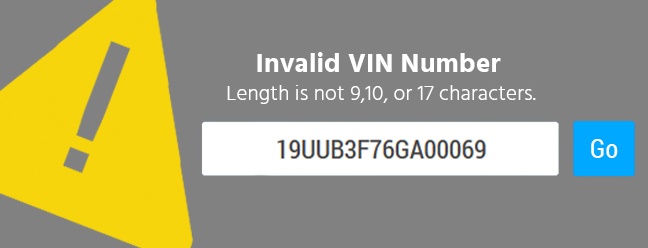

Aug 16 2022
This post has been republished with updates since its original publish date in March 2012
You've tried to decode a VIN, or a handful of VINs, but for whatever reason you keep getting an invalid VIN message. This can be extremely frustrating, especially if you have no idea what might be causing the failed decode(s). There are quite a few reasons why a VIN won't decode.
If you're having trouble decoding vehicles in your inventory, consider this list of errors and challenges commonly faced when working with Vehicle Identification Numbers.
As evident, the VIN is comprised of both numeric and alphanumeric characters. However, the letters I,O, and Q will never be found in a VIN. This is simply to avoid confusion with the numbers 1 and 0, leaving less room for error.
If your VIN contains any of these alphanumeric characters, the VIN is invalid and will not be decoded by any VIN decoding service.
As of the model year (MY) 1981, the NHTSA required all vehicles manufactured for road use to be assigned a 17-digit VIN number. So, any vehicles manufactured in 1981 or later with VINs shorter than 17 characters are invalid.
Vehicles destined for the U.S. and Canadian markets include a check digit in the ninth position to determine the VIN's validity. There are five steps to the error checking algorithm, or VIN checksum, which you can learn more about in this article on VIN Validation.
Your data provider may simply not support certain vehicle types or vehicle markets. For example, you may be trying to decode a VIN for an ATV or trailer, and your provider only covers light-duty cars and trucks. Or, you may be trying to decode a vehicle destined for sale only in Canada or in Europe, but your data provider may only cover U.S.-destination vehicles. For more information about how VINs vary by market, check out our article The Market's effect on a VIN.
For example, you may be trying to decode a Canadian vehicle using data provided by a data distributor that covers U.S. and Canadian markets. However, if your data license is limited only to U.S. vehicles, you'll need to renegotiate your contract before you can decode vehicles destined for sale only in Canada.
The vehicle you are looking to decode could be so new that it's not in your data provider's database yet. Timeliness is an important factor to consider when selecting your data provider. DataOne is a leading data provider for vehicle transport solutions, including rail, road, and transoceanic shipping of vehicles before their release. Because of this, DataOne generally has vehicle information available before new cars hit dealer lots.
Your data provider may not cover vehicles older than a certain model year. Although the majority of your inventory is likely less than ten years old, having even a small percentage of inventory that cannot be decoded could present a hardship for your business. DataOne's data provides market leading coverage back to the year the current VIN standard was implemented, 1981, for US-destination light-duty and passenger vehicles.
Unfortunately, some OEMs encode less information in their VINs than others. For example, the VIN 4T1BF1FK9GU572575 is a 2016 Toyota Camry, but it could be a Camry LE, SE, Special Edition, XSE, or XLE! The VIN alone does not tell us the trim of the vehicle.
You could handle this case by considering only the data shared by these five trims, or you could use additional identifiers such as manufacturer model number, package code, trim badging, option codes, and other descriptors to narrow your results. DataOne's VIN Decoder Web Service API can take any additional information you have about your inventory, along with the VIN, to narrow your results down to a single trim/style match.